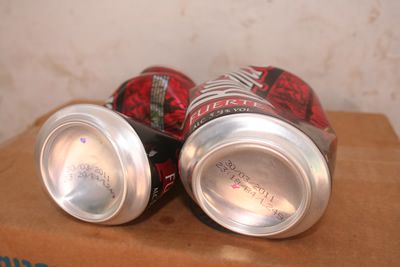
A friend called my attention to the strange colored dots on the bottoms of the cans of soft drinks and beer sold in cafes and restaurants. I looked closer and it was true, the mark was red on some, blue or green on others, all drawn with a marker. I looked around and even on the empty or half-crushed cans at the recycling center the curious "seal" was on a good share of them. The contours were not as precise as from a labeling machine, but rather showed the unsteady stroke of a hand that is doing something forbidden.
Well yes, although it might sound simple, behind this colored dot lies a lucrative network that uses the State enterprises to sell private goods. The food service employees buy the canned drinks in hard currency stores, and then sell them -- in the businesses where they work -- getting a mark-up on each one of between 10% and 50% over the initial price. During the working day they give priority to the sale of their "own" products, while setting aside or delaying the sale of those from the State. At the end of the day, with the added centavos from each sale, they accrue dividends much greater than the symbolic salary they receive in the national currency.
So the colored dots indicate who owns the drinks that have been sold. Those of the local administrator might be marked in red, the waitress's marked in blue, and the cook probably decided to opt for an orange dot. Everyone gets a share. If not, what would be the point of having to get up early, ride a packed bus, and work eight hours just to get the equivalent of $20 US dollars at the end of the month. Also, clandestine factories produce Bucanero and Cristal beers with the same appearance as the originals and even long time drinkers can barely tell the difference. These knock-off industries are located in what looks like family homes, in whose rooms a canning device snaps on the lids. These products will displace those produced by the State, with those made by the most disloyal of competitors to this great Patron, and will also rip off a good share of its customers. A labyrinthine network of counterfeiting and resale that undermines the dysfunctional centralization and diverts profits to thousands of private pockets.
Yoani's blog, Generation Y, can be read here in English translation.
